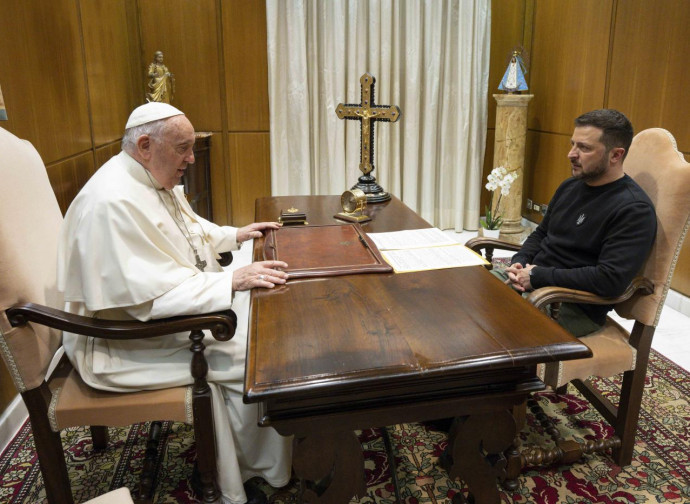War in Ukraine, Papal mediation is a mismanaged operation
The contemptuous treatment meted out to Francis by Ukrainian President Zelensky was embarrassing for the pope and the Vatican. Serious mistakes were made, precisely from the diplomatic point of view. The Catholic Church has the task of teaching justice and salvation in Christ. It must not descend to the levels of the powerful of this earth.

The contemptuous treatment meted out to Francis by Ukrainian President Zelensky - "We don't need mediators" - after their meeting a few days ago [here] was, to say the least, embarrassing for the pope and the Vatican, not at all softened by a few words of circumstance and indeed aggravated by subsequent clarifications. The image depicting Francis at the centre of a cohort of Ukrainian government officials in camouflage suits and with weapons at their sides was certainly disheartening for the Holy See. Even the protocol could not be managed. It is true that the refusal of Vatican mediation clearly revealed the Ukrainian president eager to resolve the issue by force of arms alone, not allowing the other side any chance to set the slightest condition; it is also true that the grave responsibility of the European states in arming Ukraine without pushing for any peace process emerged as a result... but it cannot be denied that for Vatican diplomacy it was a failure that has severely tarnished its image.
Serious mistakes were made, precisely from the diplomatic point of view. No one would publicly express their willingness to mediate in a conflict without first having secured the acceptance of the parties involved. The third party offering to mediate must already be certain, before publicising the proposal, that it will be accepted. Acceptance or otherwise must not be a possibility but a prior certainty. If one does not have this certainty, it is better not to offer one’s services, given the damage to the image and influence that a possible 'No' would entail.
Secondly, if a 'secret' diplomatic action is launched, why say so in an interview while it is still in progress? And yet, this is precisely what Francis did on his return from Hungary, receiving in return the rejection of the Ukrainian government, which denied that such secret diplomatic activity really existed, thereby seriously embarrassing the Vatican, so much so that even Secretary of State Parolin had to intervene. The fact remains that no one can justifiably assert whether or not it was taking place.
The whole operation of the 'mediator pope' was therefore set to fail from the beginning and throughout its course, first of all from the point of view of strict diplomatic practice. These things should be carried out silently, making sure in advance that one is accepted (when in 1978 John Paul II averted war between Chile and Argentina over the Beagle Channel issue, his mediation had been requested by the parties), one organises communication and regulates the protocol of the meetings because in terms of image they are of great importance.
This defeat contrasts with Francis' desire to position himself on the global level as a point of reference, even expressing his own 'geopolitics'. Father Antonio Spadaro, Jesuit director of 'La Civiltà Cattolica', has also written a book entitled “L’atlante di Francesco” [Francis Atlas]. According to him, Francis is against simplifiers and those who see everything as a definitive clash between good and evil; he would like to bring dialogue and mercy back to the centre of international relations, to work for a future of reconciliation. Spadaro says that “He loves to touch the open wounds that exist between peoples, between nations; he wants to touch the walls in order to heal them. The same gesture as Jesus!". Therefore, continues Spadaro, “it means that for him there are no festering situations that cannot be resolved; he wants to touch the wounded places because he knows that among peoples and nations there are no situations of conflict that cannot be resolved: it is a great opening towards the future”.
The fact is, however, that the Holy See's international prestige has declined in recent years and the latest act in this downward path has been Zelensky's 'No'. The Church's silence on the issue of human rights in China and its compromise with Beijing certainly played a role. But also the silence on old and new Latin American communist regimes. In that subcontinent there are governments, such as that of Nicaragua, that have long persecuted even churchmen, or others that accelerate the introduction of laws against life and the family, but no cries of alarm have been heard from Rome. Even with regard to Hong Kong and Venezuela, the pope has not intervened. Add to this his various 'political' speeches and the Catholic Church's substantial adherence to politically correct transitions, such as environmental and green, health, and the UN goals for 2030, which are certainly biased. All this has dimmed the international role of the Holy See.
The main question to ask is whether the Church has the task of diplomatic mediation. The Catholic Church has the task of teaching justice and salvation in Christ. It must not, therefore, descend to the levels of the powerful of this earth, posing as one of them and operating according to political criteria, which are not even well used. It may be the case that two nations, especially if of Catholic tradition, ask for mediation, but the pope must not propose himself as mediator, thus descending to a political and politicising level.


